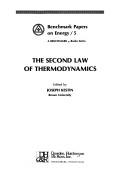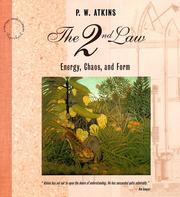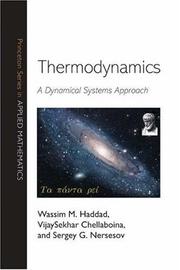| Listing 1 - 10 of 13 | << page >> |
Sort by
|

ISBN: 0879332425 Year: 1976 Publisher: Stroudsburg Dowden, Hutchinson and Ross
Abstract | Keywords | Export | Availability | Bookmark
 Loading...
Loading...Choose an application
- Reference Manager
- EndNote
- RefWorks (Direct export to RefWorks)
Book
ISBN: 0852989423 Year: 1995 Publisher: London Mechanical engineering publ.
Abstract | Keywords | Export | Availability | Bookmark
 Loading...
Loading...Choose an application
- Reference Manager
- EndNote
- RefWorks (Direct export to RefWorks)
536.73 --- Second law of thermodynamics --- 536.73 Second law of thermodynamics
Book
ISBN: 1281968293 9786611968298 9812832262 9789812832269 9812832254 9789812832252 Year: 2008 Publisher: New Jersey World Scientific
Abstract | Keywords | Export | Availability | Bookmark
 Loading...
Loading...Choose an application
- Reference Manager
- EndNote
- RefWorks (Direct export to RefWorks)
In this unique book, the reader is invited to experience the joy of appreciating something which has eluded understanding for many years - entropy and the Second Law of Thermodynamics. The book has a two-pronged message: first, that the second law is not infinitely incomprehensible as commonly stated in most textbooks on thermodynamics, but can, in fact, be comprehended through sheer common sense; and second, that entropy is not a mysterious quantity that has resisted understanding but a simple, familiar and easily comprehensible concept.Written in an accessible style, the book guides the read
Entropy. --- Second law of thermodynamics. --- 2nd law of thermodynamics --- Laws of thermodynamics --- Thermodynamics --- Second law of thermodynamics --- thermodynamica --- entropie --- Entropy
Book
ISBN: 9781009217347 1009217348 9781009500173 9781009217309 1009217313 100921733X Year: 2024 Publisher: Cambridge Cambridge University Press
Abstract | Keywords | Export | Availability | Bookmark
 Loading...
Loading...Choose an application
- Reference Manager
- EndNote
- RefWorks (Direct export to RefWorks)
The Element reconstructs, analyses and compares different derivational routes to a grounding of the Arrow of Time in entropy. It also evaluates the link between entropy and visible disorder, and the related claim of an alignment of the Arrow of Time with a development from order to visible disorder. The Element identifies three different entropy-groundings for the Arrow of Time: (i) the Empirical Arrow of Time, (ii) the Universal Statistical Arrow of Time, and (iii) the Local Statistical Arrow of Time. The Element will also demonstrate that it is unlikely that high entropy states will always coincide with visible disorder. Therefore, it will dispute that there is a strong link between the Arrow of Time and visible disorder.
Entropy. --- Second law of thermodynamics. --- Statistical thermodynamics. --- Time. --- Time reversal. --- Time --- Philosophy.

ISBN: 0716760061 071675004X 9780716760061 9780716750048 Year: 1994 Publisher: New York Scientific American Books
Abstract | Keywords | Export | Availability | Bookmark
 Loading...
Loading...Choose an application
- Reference Manager
- EndNote
- RefWorks (Direct export to RefWorks)
Chemical thermodynamics --- fysicochemie --- 536.73 --- #TWER:TTI:Boek --- Heat-engines --- Second law of thermodynamics --- 536.73 Second law of thermodynamics --- Thermodynamics --- #TWER:TTI --- #WSCH:AAS1 --- #WSCH:AAS2 --- Chemistry, Physical and theoretical --- Dynamics --- Mechanics --- Physics --- Heat --- Quantum theory --- Thermodynamics. --- Symmetry. --- ENERGY --- CHAOS --- Dissymmetry --- Temperature. --- Entropy. --- Cold --- Aesthetics --- Proportion --- Monograph
Book
ISBN: 9780521405980 052140598X 9781107617063 Year: 2013 Publisher: New York : Cambridge University Press,
Abstract | Keywords | Export | Availability | Bookmark
 Loading...
Loading...Choose an application
- Reference Manager
- EndNote
- RefWorks (Direct export to RefWorks)
Continuum mechanics --- Thermodynamics --- Mathematics. --- 536.73 --- 536.73 Second law of thermodynamics --- 539.3 --- Mechanics of continua --- Second law of thermodynamics --- 539.3 Elasticity. Deformation. Mechanics of elastic solids --- Elasticity. Deformation. Mechanics of elastic solids --- Chemistry, Physical and theoretical --- Dynamics --- Mechanics --- Physics --- Heat --- Heat-engines --- Quantum theory --- Elasticity --- Mechanics, Analytic --- Field theory (Physics) --- Mathematics
Book
ISBN: 9781107019683 9781107424326 9781139095167 1107019680 9781107019638 110701963X 1139095161 9781139569118 1139569112 9781139572675 1139572679 6613951137 9786613951137 1283638673 9781283638678 1139888757 9781139888752 1139579495 9781139579490 1139573462 9781139573467 1139570927 9781139570923 1139570013 9781139570015 1107424321 Year: 2012 Publisher: Cambridge: Cambridge university press,
Abstract | Keywords | Export | Availability | Bookmark
 Loading...
Loading...Choose an application
- Reference Manager
- EndNote
- RefWorks (Direct export to RefWorks)
Time asymmetric phenomena are successfully predicted by statistical mechanics. Yet the foundations of this theory are surprisingly shaky. Its explanation for the ease of mixing milk with coffee is incomplete, and even implies that un-mixing them should be just as easy. In this book the authors develop a new conceptual foundation for statistical mechanics that addresses this difficulty. Explaining the notions of macrostates, probability, measurement, memory, and the arrow of time in statistical mechanics, they reach the startling conclusion that Maxwell's Demon, the famous perpetuum mobile, is consistent with the fundamental physical laws. Mathematical treatments are avoided where possible, and instead the authors use novel diagrams to illustrate the text. This is a fascinating book for graduate students and researchers interested in the foundations and philosophy of physics.
Maxwell's demon --- Second law of thermodynamics --- Statistical thermodynamics --- Maxwell, James Clerk, --- Maxwell, James Clerk --- Statistical mechanics --- Second law of thermodynamics. --- Statistical thermodynamics. --- Maxwell, Démon de --- Mécanique statistique --- Deuxième principe de la thermodynamique --- Thermodynamique statistique --- Maxwell's demon. --- Demon of Maxwell --- Maxwell demon --- Thermodynamics --- Quantum theory --- Statistical physics --- 2nd law of thermodynamics --- Laws of thermodynamics --- Maksvell, Dzhems Klerk, --- Maxwell, J. Clerk --- Maxwell, J. C. --- Maxwell, Clerk, --- Maksvell, Dzheĭms Klerk, --- Physics --- General and Others --- Maxwell, James Clerk, - 1831-1879
Book
ISBN: 9780674269712 0674269713 Year: 2022 Publisher: Cambridge : Harvard University Press,
Abstract | Keywords | Export | Availability | Bookmark
 Loading...
Loading...Choose an application
- Reference Manager
- EndNote
- RefWorks (Direct export to RefWorks)
A renowned philosopher’s final work, illuminating how the logical empiricist tradition has failed to appreciate the role of actual experiments in forming its philosophy of science. The logical empiricist treatment of physics dominated twentieth-century philosophy of science. But the logical empiricist tradition, for all it accomplished, does not do justice to the way in which empirical evidence functions in modern physics. In his final work, the late philosopher of science William Demopoulos contends that philosophers have failed to provide an adequate epistemology of science because they have failed to appreciate the tightly woven character of theory and evidence. As a consequence, theory comes apart from evidence. This trouble is nowhere more evident than in theorizing about particle and quantum physics. Arguing that we must consider actual experiments as they have unfolded across history, Demopoulos provides a new epistemology of theories and evidence, albeit one that stands on the shoulders of giants. On Theories finds clarity in Isaac Newton’s suspicion of mere “hypotheses.” Newton’s methodology lies in the background of Jean Perrin’s experimental investigations of molecular reality and of the subatomic investigations of J. J. Thomson and Robert Millikan. Demopoulos extends this account to offer novel insights into the distinctive nature of quantum reality, where a logico-mathematical reconstruction of Bohrian complementarity meets John Stewart Bell’s empirical analysis of Einstein’s “local realism.” On Theories ultimately provides a new interpretation of quantum probabilities as themselves objectively representing empirical reality.
Empiricism. --- Physics --- Quantum theory. --- Science --- SCIENCE / Physics / Quantum Theory. --- Normal science --- Philosophy of science --- Quantum dynamics --- Quantum mechanics --- Quantum physics --- Mechanics --- Thermodynamics --- Experience --- Knowledge, Theory of --- Rationalism --- Philosophy. --- Avogadro’s constant. --- Bell’s theorem. --- Bohr. --- Brownian motion. --- Gleason’s theorem. --- Gödel. --- Hilbertian axiomatics. --- Maxwell-Boltzmann statistics. --- Poincaré. --- Putnam. --- Ramsey sentences. --- constructive empiricism. --- quantum logic. --- second law of thermodynamics.
Book
Year: 2020 Publisher: Basel, Switzerland MDPI - Multidisciplinary Digital Publishing Institute
Abstract | Keywords | Export | Availability | Bookmark
 Loading...
Loading...Choose an application
- Reference Manager
- EndNote
- RefWorks (Direct export to RefWorks)
This book results from a Special Issue related to the latest progress in the thermodynamics of machines systems and processes since the premonitory work of Carnot. Carnot invented his famous cycle and generalized the efficiency concept for thermo-mechanical engines. Since that time, research progressed from the equilibrium approach to the irreversible situation that represents the general case. This book illustrates the present state-of-the-art advances after one or two centuries of consideration regarding applications and fundamental aspects. The research is moving fast in the direction of economic and environmental aspects. This will probably continue during the coming years. This book mainly highlights the recent focus on the maximum power of engines, as well as the corresponding first law efficiency upper bounds.
thermodynamics --- optimization --- entropy analysis --- Carnot engine --- modelling with time durations --- steady-state modelling --- transient conditions --- converter irreversibility --- sequential optimization --- Finite physical Dimensions Optimal Thermodynamics --- global efficiency --- energy efficiency --- heat engine --- heat pump --- utilization --- Carnot efficiency --- comparison --- thermal system --- cycle analysis --- second law of thermodynamics --- Clausius Statement --- theorem of the equivalence of transformations --- linear irreversible thermodynamics --- maximum power output --- maximum ecological Function --- maximum efficient power function --- enzymatic reaction model --- ocean thermal energy conversion (OTEC) --- plate heat exchanger --- finite-time thermodynamics --- heat transfer entropy --- entropy production --- new efficiency limits --- two-stage LNG compressor --- energy losses --- exergy destruction --- exergy efficiency --- Stirling cycle --- refrigerator --- heat exchanger --- second law --- n/a

ISBN: 1680159046 1282158309 9786612158308 1400826977 9781400826971 9781680159042 0691123276 9780691123271 Year: 2009 Publisher: Princeton, NJ
Abstract | Keywords | Export | Availability | Bookmark
 Loading...
Loading...Choose an application
- Reference Manager
- EndNote
- RefWorks (Direct export to RefWorks)
This book places thermodynamics on a system-theoretic foundation so as to harmonize it with classical mechanics. Using the highest standards of exposition and rigor, the authors develop a novel formulation of thermodynamics that can be viewed as a moderate-sized system theory as compared to statistical thermodynamics. This middle-ground theory involves deterministic large-scale dynamical system models that bridge the gap between classical and statistical thermodynamics. The authors' theory is motivated by the fact that a discipline as cardinal as thermodynamics--entrusted with some of the most perplexing secrets of our universe--demands far more than physical mathematics as its underpinning. Even though many great physicists, such as Archimedes, Newton, and Lagrange, have humbled us with their mathematically seamless eurekas over the centuries, this book suggests that a great many physicists and engineers who have developed the theory of thermodynamics seem to have forgotten that mathematics, when used rigorously, is the irrefutable pathway to truth. This book uses system theoretic ideas to bring coherence, clarity, and precision to an extremely important and poorly understood classical area of science.
Thermodynamics --- Differentiable dynamical systems. --- Differential dynamical systems --- Dynamical systems, Differentiable --- Dynamics, Differentiable --- Differential equations --- Global analysis (Mathematics) --- Topological dynamics --- Chemistry, Physical and theoretical --- Dynamics --- Mechanics --- Physics --- Heat --- Heat-engines --- Quantum theory --- Mathematics. --- Addition. --- Adiabatic process. --- Applied mathematics. --- Arthur Eddington. --- Asymmetry. --- Available energy (particle collision). --- Axiom. --- Balance equation. --- Banach space. --- Boltzmann's entropy formula. --- Brillouin scattering. --- Carnot cycle. --- Classical mechanics. --- Clausius (crater). --- Compact space. --- Conservation law. --- Conservation of energy. --- Constant of integration. --- Continuous function (set theory). --- Continuous function. --- Control theory. --- Deformation (mechanics). --- Derivative. --- Diathermal wall. --- Diffeomorphism. --- Differentiable function. --- Diffusion process. --- Dimension (vector space). --- Dimension. --- Dissipation. --- Dot product. --- Dynamical system. --- Emergence. --- Energy density. --- Energy level. --- Energy storage. --- Energy. --- Entropy. --- Equation. --- Equations of motion. --- Equilibrium point. --- Equilibrium thermodynamics. --- Equipartition theorem. --- Existential quantification. --- First law of thermodynamics. --- Hamiltonian mechanics. --- Heat capacity. --- Heat death of the universe. --- Heat flux. --- Heat transfer. --- Homeomorphism. --- Hydrogen atom. --- Ideal gas. --- Inequality (mathematics). --- Infimum and supremum. --- Infinitesimal. --- Initial condition. --- Instant. --- Internal energy. --- Irreversible process. --- Isolated system. --- Kinetic theory of gases. --- Laws of thermodynamics. --- Linear dynamical system. --- Lipschitz continuity. --- Local boundedness. --- Lyapunov function. --- Lyapunov stability. --- Mathematical optimization. --- Molecule. --- Non-equilibrium thermodynamics. --- Operator norm. --- Probability. --- Quantity. --- Reversible process (thermodynamics). --- Second law of thermodynamics. --- Semi-infinite. --- Smoothness. --- State variable. --- State-space representation. --- Statistical mechanics. --- Steady state. --- Summation. --- Supply (economics). --- Systems theory. --- Temperature. --- Theorem. --- Theoretical physics. --- Theory. --- Thermal conduction. --- Thermal equilibrium. --- Thermodynamic equilibrium. --- Thermodynamic process. --- Thermodynamic state. --- Thermodynamic system. --- Thermodynamic temperature. --- Thermodynamics. --- Time evolution. --- Zeroth law of thermodynamics.
| Listing 1 - 10 of 13 | << page >> |
Sort by
|

 Search
Search Feedback
Feedback About UniCat
About UniCat  Help
Help News
News